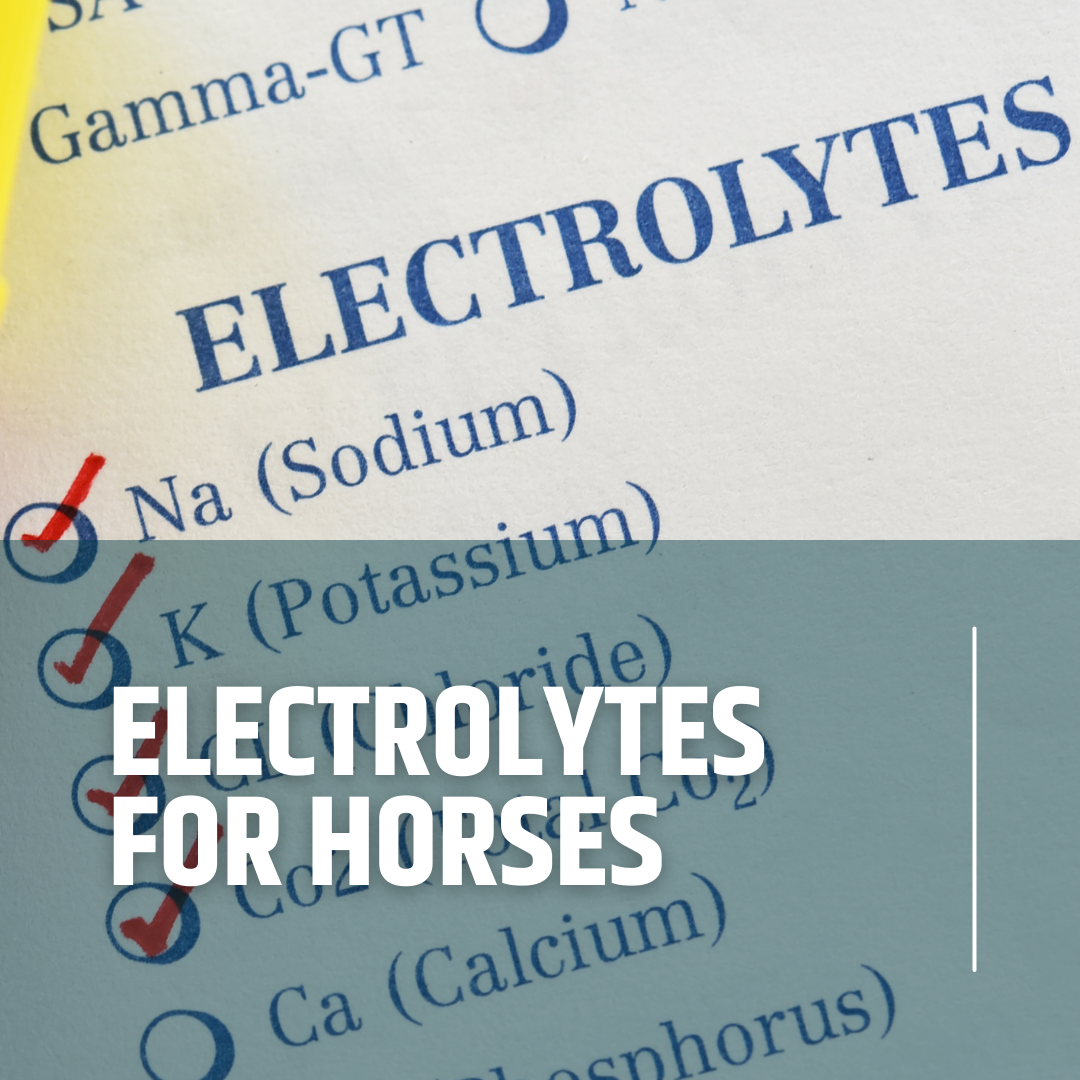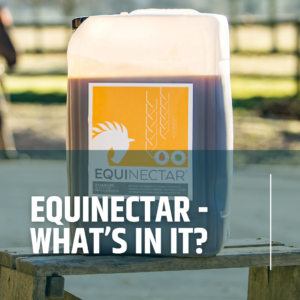

Ben Nedas
Chief Commercial Officer
Electrolytes for horses
01
What are electrolytes for horses?
Electrolytes are essential minerals that play a crucial role in maintaining physiological balance in horses. These minerals, including sodium, potassium, chloride, calcium, and magnesium, are pivotal in numerous bodily functions. They are especially important in regulating nerve and muscle function, balancing fluid levels, and supporting proper hydration.
Sodium and chloride: Sodium and chloride are the primary components of table salt. They are vital for fluid balance and nerve function. Horses lose sodium and chloride primarily through sweat, especially during intense exercise or in hot weather. It's essential to replace these lost electrolytes to prevent dehydration and maintain normal bodily functions.
Potassium: This mineral is crucial for muscle function and is the primary electrolyte found inside the horse's cells. Potassium is vital for normal muscle contractions and heart function. A deficiency can lead to muscle weakness or disorders like hyponatremia.
Calcium and magnesium: These electrolytes are integral for muscle function and bone health. Calcium plays a vital role in muscle contractions and nerve signalling, while magnesium is crucial for muscle relaxation. An imbalance in calcium and magnesium levels can lead to muscle cramps and spasms.
Electrolytes are lost through urine, faeces, and particularly through sweat. Horses have a higher sweat rate than many other animals, making them more susceptible to electrolyte imbalances, especially during periods of high physical activity or heat. It's important to note that while electrolytes are lost during sweating, the concentration of electrolytes in sweat is lower than in the blood. This means that excessive sweating can lead to an increased concentration of electrolytes in the body, a condition known as hypernatremia.
To maintain electrolyte balance, horses need access to a balanced diet and ample fresh water. In some cases, especially for horses involved in rigorous exercise or those living in hot climates, supplemental electrolytes may be necessary. These supplements are formulated to replace the electrolytes lost in sweat and should be used under the guidance of a veterinarian or an equine nutritionist to ensure the horse's dietary needs are met without causing an imbalance.
02
Why should I use electrolytes for my horse?
The use of electrolytes in horses is not just beneficial but often necessary for maintaining health and optimal performance. Here are several reasons why incorporating electrolytes into a horse's regimen can be crucial:
1. Recovery and performance during exercise: During exercise, horses lose a significant amount of electrolytes through sweat. This loss can impair muscle function and reduce stamina, affecting performance. By replenishing these lost electrolytes, you help your horse maintain muscle function and recover more efficiently post-exercise.
2. Prevention of dehydration: Electrolytes play a key role in regulating fluid balance. When horses lose electrolytes, they also lose the ability to balance fluids effectively, leading to dehydration. Providing electrolytes, especially during hot weather or periods of heavy sweating, helps maintain hydration levels, which are essential for overall health.
3. Supporting healthy nerve function: Electrolytes are crucial for the proper functioning of nerves. Imbalances can lead to neurological issues, ranging from mild behavioural changes to severe conditions like tying-up syndrome, where the horse experiences severe muscle cramps and stiffness.
4. Enhancing feed and water intake: Electrolytes can stimulate thirst, encouraging horses to drink more water, which is beneficial in preventing dehydration. Additionally, they can also enhance the palatability of feed, encouraging better feed intake.
5. Aiding in stressful situations: Situations such as long-distance travel, high-intensity training, or environmental changes can stress a horse's system. Electrolytes can help support the horse in these situations by maintaining proper physiological balance.
6. Supporting horses on restricted diets: Horses on restricted diets, particularly those with limited access to fresh pasture, may not receive adequate levels of electrolytes. Supplementation can help fill this nutritional gap.
7. Correcting electrolyte imbalances: Certain health conditions or dietary insufficiencies can lead to electrolyte imbalances. Supplementing with electrolytes can correct these imbalances, helping to avoid the complications associated with them.
04
What's the correct balance of electrolytes to give a horse?
Determining the correct balance of electrolytes to give a horse is crucial for maintaining their health and performance. The exact requirements can vary based on several factors, such as the horse's size, diet, workload, and environmental conditions. Here are key considerations for achieving the right balance:
1. Understanding individual needs: Each horse has unique electrolyte needs depending on their level of activity, sweat rate, diet, and environmental conditions. For example, a horse in heavy training or in hot climates will have higher electrolyte needs compared to a horse with light exercise routines in cooler conditions.
2. Balanced electrolyte supplements: Electrolyte supplements should ideally mimic the proportion of electrolytes lost in the horse's sweat. This typically includes higher levels of sodium and chloride, followed by potassium, and smaller amounts of calcium and magnesium. It's important to choose a supplement that offers this balanced ratio.
3. Avoid over-supplementation: While electrolyte deficiency can be detrimental, over-supplementation can also lead to imbalances and health issues. Excessive sodium, for instance, can lead to dehydration if the water intake is not adequate. The key is to supplement based on the horse’s actual needs rather than a fixed routine.
05
I'm concerned about hydration for my horse. What other steps can I take?
Ensuring adequate hydration for horses is paramount to their health and well-being. Here are several strategies to encourage your horse to drink more water, including the use of EquiNectar:
1. Add EquiNectar to the water. One effective way to encourage horses to drink more is by adding EquiNectar to their water. Customers have reported that their horses are particularly fond of the taste when EquiNectar is added, leading to increased water consumption. EquiNectar, being a digestive supplement, not only makes the water more palatable but also aids in digestion, providing a dual benefit.
2. Supply clean, fresh water: Make sure that clean, fresh water is always available. Horses are more likely to drink when the water is fresh and free of debris. Regularly clean water troughs and buckets to maintain cleanliness and freshness.
3. Monitor water temperature: Extreme water temperatures can be off-putting to horses. In summer, try to provide cool water, and in winter, slightly warmed water can encourage drinking. Avoid ice-cold water, especially after exercise.
4. Offer wet feed: Increase water intake through the diet by offering wet feeds. Soaked hay, haylage, or beet pulp can significantly increase water consumption as well as provide hydration in a form that horses may find more appealing.
5. Frequent, small meals: Feeding little and often can help maintain a regular drinking pattern. Large meals, particularly of dry feed, can lead to reduced water intake and potentially increase the risk of dehydration.
6. Training and routine: Horses are creatures of habit. Training them to drink from a bucket during travel or unfamiliar environments can be beneficial. Establishing a routine that includes regular opportunities to drink can also encourage more consistent water intake.
7. Monitor for changes: Keep an eye on your horse's drinking habits. Changes can indicate health issues, such as dental problems or illness, that may require veterinary attention.




